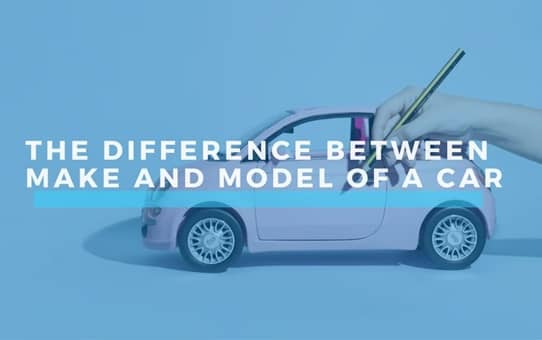When it comes to identifying a car, two essential terms come into play: make and model. The make and model of a car provide vital information about its manufacturer, design, and specifications.
Understanding these terms is crucial for all car users. In this blog, we will know what a car Make and model are, their differences, examples and importance.
What is the Make and Model of a Car?
Without much ado, let’s see what defines the make and model of a car.
What is a Car Make?
The make of a car refers to the brand or manufacturer responsible for producing the vehicle. Some well-known car makes include Ford, Toyota, Honda, BMW, and Mercedes-Benz.
Each make typically has its own unique characteristics, design philosophy, and reputation based on its history and performance in the industry.
What is a Car Model?
The model of a car provides specific information about a particular version or variation produced by a specific make. It is usually denoted by a combination of numbers, letters, or both.
For example, the Toyota Camry, Ford Mustang, and BMW 3 Series are popular car models. These models just represent the specific design, features, and options available within a particular make’s lineup.
Each car model also has different model years, with each model year having different features and packages.
Differences Between Cars of the same Model?
The make and model give a basic idea of a car, but things like trim, options, year, and region can make each one different. Let’s see how these details matter:
Trim Levels
Trims are different versions of the same car model, each offering its own features and price. Higher trims often include better performance, comfort, and tech. For example, a base trim may have basic features, while a higher trim might include leather seats, advanced safety, and premium audio. This helps buyers pick the right mix of comfort, performance, and budget. Some examples of models with different trims are:
- Honda Civic:
- LX
- EX
- EX-T
- Touring
- Ford Mustang:
- EcoBoost
- GT
- Shelby GT350
- Shelby GT500
ALSO READ: Is It Better to Buy a Used Car Compared to a New Car?
Optional Features and Packages
Beyond trim levels, car models offer optional features and packages—like upgraded audio, safety tech, or a sunroof—so buyers can customize their vehicle. These choices let buyers tailor cars to their needs and budget, making each one more unique—even within the same model.
For example:
- Audi A4:
- Technology package (includes advanced infotainment and driver-assistance features)
- Sport package (enhanced sporty styling and performance features)
- Luxury package (upgraded interior materials and comfort features)
- Subaru Forester:
- All-Weather package (heated seats, heated mirrors, and windshield wiper de-icer)
- Premium package (upgraded audio system, panoramic sunroof, and power liftgate)
- Off-Road package (enhanced off-road capabilities, all-terrain tires, and skid plates)
Production Years
The production year is the year a car was made. Over time, car models get updates in design, technology, and performance. So, the same model from different years can look and perform differently. For example:
- BMW 3 Series:
- E46 generation (produced from 1998 to 2006)
- F30 generation (produced from 2012 to 2019)
- G20 generation (introduced in 2019 and ongoing)
- Volkswagen Golf:
- Mk6 generation (produced from 2008 to 2013)
- Mk7 generation (produced from 2012 to 2020)
- Mk8 generation (introduced in 2019 and ongoing)
Regional Specifications and Regulations
What about the specifications for specific countries or regions? Their policies and requirements for emissions, safety features, lighting, and other aspects of vehicle design may result in car manufacturers making modifications to certain features or components to comply with these regulations.
For example, some countries may have different safety standards, resulting in variations in airbag systems or advanced driver-assistance systems (ADAS) between the same model sold in different regions.
Customization
Many car buyers enjoy customizing their vehicles with options like paint colors, wheels, upholstery, and interior trims. These choices help reflect personal style and preferences.
Even cars with the same make and model can differ due to trim levels, features, production years, regional specs, and custom options. That’s why it’s important for buyers to review these details to choose the version that fits their needs best
What Used Car Buyers Need to Know
When you fully understand what the make and model of a car are, and what other specifications you need to take into consideration when buying a car, you can easily identify the car that is best suited and built to meet your needs and budget.
How to Check a Car's Make and Model
To easily identify the make and model of a used car, use a VIN decoder to analyze the VIN to reveal the specifications including the year, make and model.
A physical inspection can help in identifying the Make and model. Look for identifying badges, emblems, or logos on the exterior and interior. The make is often displayed prominently on the front grille or trunk, while the model may be indicated on the rear or side of the vehicle.
Check the owner’s manual, registration documents, or service records, which may also contain information about the make and model.
Our VIN decoder is 100% free and accurate, and with it, you can tell the make and model of a car and identify other specifications such as:
- Year
- Trim
- Engine Description
- Country
- Width
- Width
- Length
- Height
- Standard seating
- Engine Size
- Transmission style
- Brakes
- Drive type
- Body type
- Fuel type
- Displacement
- Engine model
- Valve train design
- Engine configuration
- Front airbag information
- Tire pressure and monitoring system type
- Seat belt type, and more.
Used car buyers can also get the vehicle history report to access the history and condition of a car before buying.
When does a Car Make and Model Matter?
Let’s explore in more detail why these two terms hold such importance:
Vehicle Identification
A car’s make and model help clearly identify it. Whether talking to mechanics, insurers, or other drivers, this info avoids confusion and ensures everyone knows which vehicle you’re referring to.
Performance and Specifications
The make and model reveal key details about a car’s performance and features. Each brand has its own design style and reliability. Models within a brand offer different engines, powertrains, and performance levels—whether you want a fuel-efficient ride, a sporty car, or something built for off-road driving.
Brand Reputation and Customer Satisfaction
Car brands earn their reputations through history, quality, and customer feedback. Knowing a car’s make and model gives insight into its reliability, performance, or luxury—helping you make a smarter long-term choice.
Buying Decisions
When buying a car, the make and model are key factors. Many buyers choose makes based on brand reputation or past experience. Models help narrow choices with different trims, features, and packages.
For instance, you can easily choose between a fuel efficient Honda Civic or luxury and performance car like the BMW 3 Series
Resale Value
Car makes and models differ in how well they hold their value. Brands known for quality and reliability often have stronger resale prices. Even within the same brand, some models retain value better than others. Knowing this can help you make smarter financial choices when buying or planning to resell.
Conclusion
Understanding a car’s make and model helps you recognize its features, performance, and value. It also reflects brand reputation and affects resale price. If you’re buying or selling a used car, having the right information can lead to better buying and selling decisions. With a VIN decoder, you can quickly confirm a vehicle’s exact make and model before making a deal.









